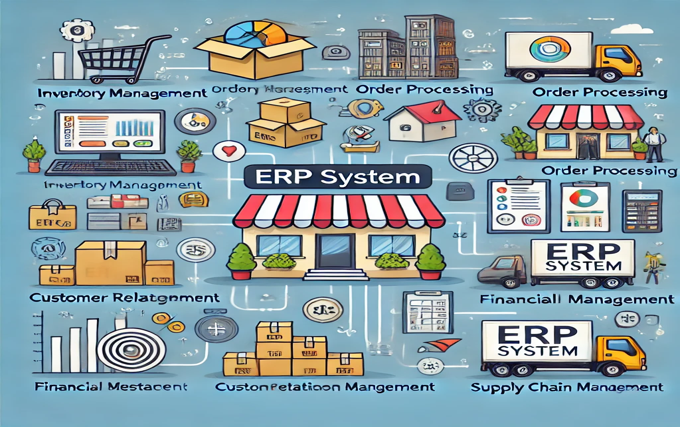In the rapidly evolving world of e-commerce, businesses constantly seek ways to stay ahead of the competition. One of the most effective strategies is integrating Enterprise Resource Planning (ERP) systems. This comprehensive guide explores how ERP solutions can revolutionize your e-commerce business, ensuring streamlined operations, improved customer satisfaction, and enhanced profitability.
What is ERP?
Enterprise Resource Planning (ERP) is a type of software used by organizations to manage and integrate the important parts of their businesses. An ERP software system can integrate planning, purchasing inventory, sales, marketing, finance, human resources, and more. By consolidating these processes into a single system, businesses can operate more efficiently and gain valuable insights into their operations.
Integrating an ERP system into your e-commerce business can provide numerous benefits, including improved efficiency, enhanced customer satisfaction, and increased profitability. By carefully selecting the right ERP solution, exploring financial support options like money lenders near me, and executing a well-planned implementation process, you can maximize these benefits and take your business to the next level.
Key Features of ERP Systems
- Centralized Database: A single source of truth for all business data.
- Automation: Streamlines and automates routine tasks.
- Integration: Seamless integration of various business processes.
- Analytics and Reporting: Advanced tools for data analysis and reporting.
- Scalability: Systems can grow with your business needs.
The Role of ERP in E-commerce
In the e-commerce sector, ERP systems play a crucial role in managing the complexities of online business operations. From inventory management to customer service, ERP solutions provide a unified platform to manage all aspects of an e-commerce business.
Inventory Management
Managing inventory effectively is critical in e-commerce. An ERP system provides real-time visibility into inventory levels, ensuring that stock is always available when needed. This minimizes the risk of stockouts and overstock situations, optimizing storage costs and improving cash flow.
Benefits of ERP in Inventory Management
- Real-time Tracking: Monitor inventory levels in real-time across multiple locations.
- Automated Reordering: Set automatic reorder points to prevent stockouts.
- Warehouse Management: Efficiently manage warehouse operations with streamlined processes.
- Demand Forecasting: Use historical data to predict future inventory needs.
Order Management
An ERP system simplifies order management by automating the entire order-to-cash process. This includes order entry, order tracking, invoicing, and payment processing. By streamlining these processes, businesses can reduce errors, speed up order fulfillment, and enhance customer satisfaction.
Key Features in Order Management
- Order Processing: Automate order entry and processing for faster fulfillment.
- Customer Tracking: Provide customers with real-time updates on their order status.
- Returns Management: Simplify the process of managing returns and exchanges.
- Multi-channel Support: Manage orders from various sales channels in a single system.
Customer Relationship Management (CRM)
ERP systems often include CRM functionality, which is essential for e-commerce businesses. A CRM module helps manage customer interactions, track purchase history, and analyze customer behavior. This information is invaluable for creating targeted marketing campaigns and improving customer service.
Enhancing Customer Relationships with ERP
- Personalized Marketing: Use customer data to create personalized marketing campaigns.
- Customer Support: Provide better customer support with access to comprehensive customer information.
- Loyalty Programs: Implement and manage loyalty programs to retain customers.
- Feedback Management: Collect and analyze customer feedback to improve products and services.
Financial Management
Accurate financial management is crucial for any business, and e-commerce is no exception. ERP systems offer comprehensive financial management tools, including accounting, budgeting, forecasting, and financial reporting. These tools help businesses maintain financial health and make informed decisions.
Financial Features in ERP Systems
- Accounting: Manage all financial transactions, including accounts payable and receivable.
- Budgeting and Forecasting: Create and manage budgets, and forecast future financial performance.
- Financial Reporting: Generate detailed financial reports for analysis and decision-making.
- Tax Management: Simplify tax calculations and compliance with local regulations.
Supply Chain Management
An efficient supply chain is the backbone of a successful e-commerce business. ERP systems provide tools to manage the entire supply chain, from procurement to delivery. This ensures that products are sourced, manufactured, and delivered efficiently, reducing costs and improving customer satisfaction.
Streamlining Supply Chain with ERP
- Procurement: Automate procurement processes to ensure timely and cost-effective sourcing.
- Supplier Management: Manage relationships with suppliers and monitor their performance.
- Logistics: Optimize logistics and transportation to reduce delivery times and costs.
- Inventory Optimization: Ensure the right products are available at the right time.
Choosing the Right ERP System for Your E-commerce Business
Selecting the right ERP system is critical for maximizing its benefits. Here are some factors to consider when choosing an ERP solution for your e-commerce business.
Assess Your Business Needs
Start by assessing your business needs and identifying the key areas where an ERP system can provide the most value. Consider your current pain points and how an ERP solution can address them.
Evaluate ERP Features
Look for an ERP system that offers features specifically designed for e-commerce businesses. These should include inventory management, order management, CRM, financial management, and supply chain management.
Scalability
Choose an ERP system that can scale with your business as it grows. This ensures that the system will continue to meet your needs as your business expands.
Integration Capabilities
Ensure that the ERP system can integrate seamlessly with your existing software and tools. This includes your e-commerce platform, payment gateways, and other essential applications.
Vendor Support
Select a vendor that offers robust support and training. This is crucial for ensuring a smooth implementation and addressing any issues that arise.
Implementing an ERP System
Implementing an ERP system can be a complex process, but with careful planning and execution, it can be done successfully. Here are some steps to guide you through the implementation process.
Planning and Preparation
Begin by creating a detailed implementation plan. This should include timelines, milestones, and responsibilities. Ensure that all stakeholders are involved in the planning process.
Data Migration
Data migration is a critical step in the implementation process. Ensure that all relevant data is accurately transferred to the new system. This may involve cleaning and formatting data to ensure compatibility.
Testing
Before going live, thoroughly test the ERP system to identify and address any issues. This should include testing all key functionalities and integrations.
Training
Provide comprehensive training for all users to ensure they are comfortable using the new system. This may involve on-site training, online courses, and user manuals.
Go Live
Once testing and training are complete, you can go live with the new ERP system. Monitor the system closely during the initial period to address any issues that arise.
Post-Implementation Support
Ensure that you have access to ongoing support from the vendor. This is crucial for addressing any post-implementation issues and ensuring the system continues to meet your needs.
Conclusion
Integrating an ERP system into your e-commerce business can provide numerous benefits, including improved efficiency, enhanced customer satisfaction, and increased profitability. By carefully selecting the right ERP solution and executing a well-planned implementation process, you can maximize these benefits and take your business to the next level.
In the ever-evolving landscape of e-commerce, staying ahead of the competition requires leveraging the best tools and technologies available. ERP systems are a powerful solution that can help you streamline your operations, make informed decisions, and ultimately, drive growth and success for your e-commerce business.



Pingback: erp ecommerce blog.kristenly.com: Enhancing Scalability
Pingback: ERP is Essential for eCommerce: Strategies for blog.kristenly.com
Pingback: ERP eCommerce Blog.Kristenly.com: Resource for ERP Integration
Pingback: erp ecommerce blog.kristenly.com Made Easy Insights
Pingback: Benefits of Integrating erp ecommerce blog.kristenly.com Platforms